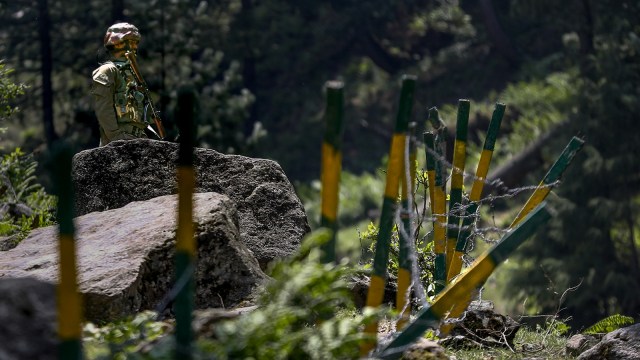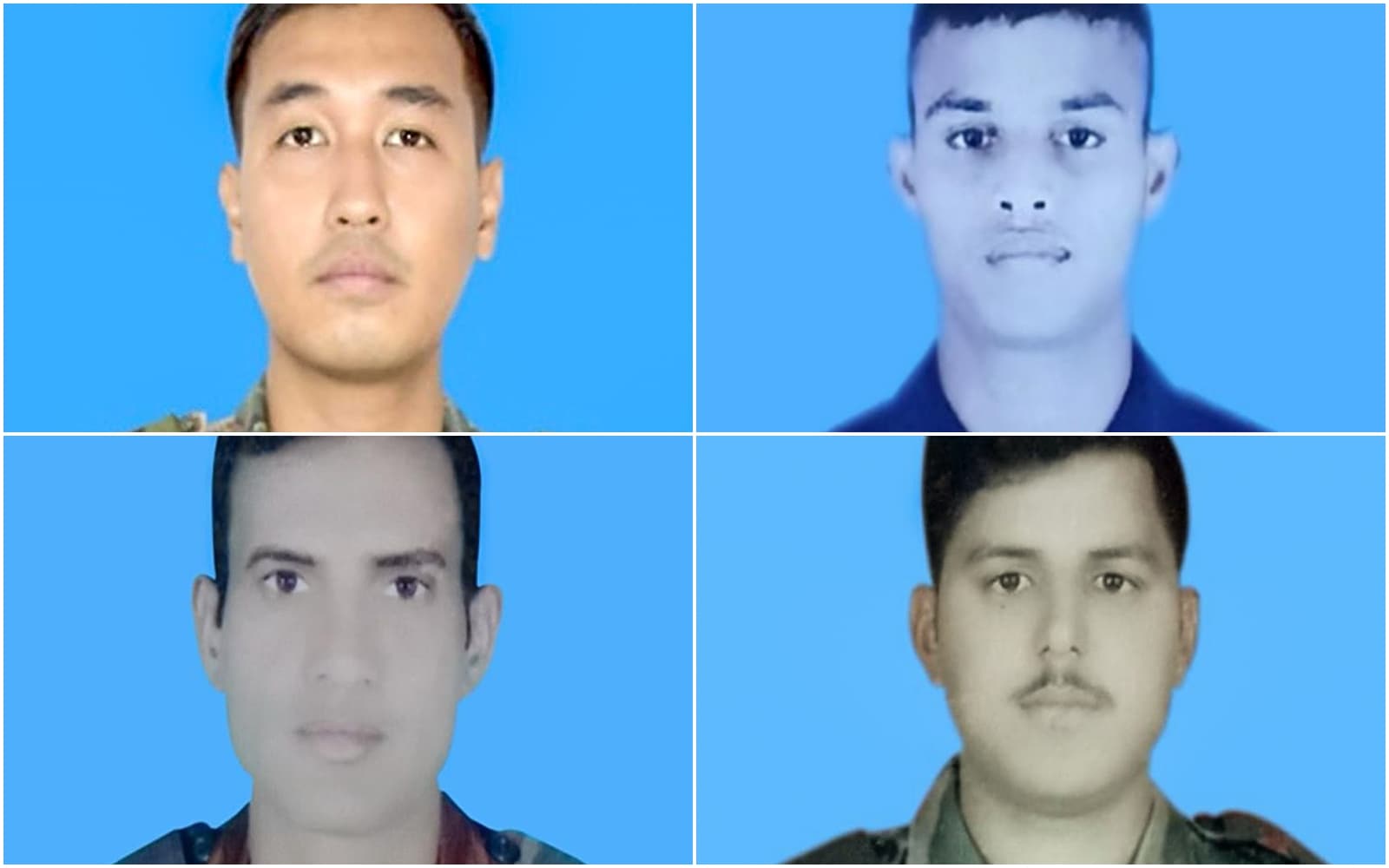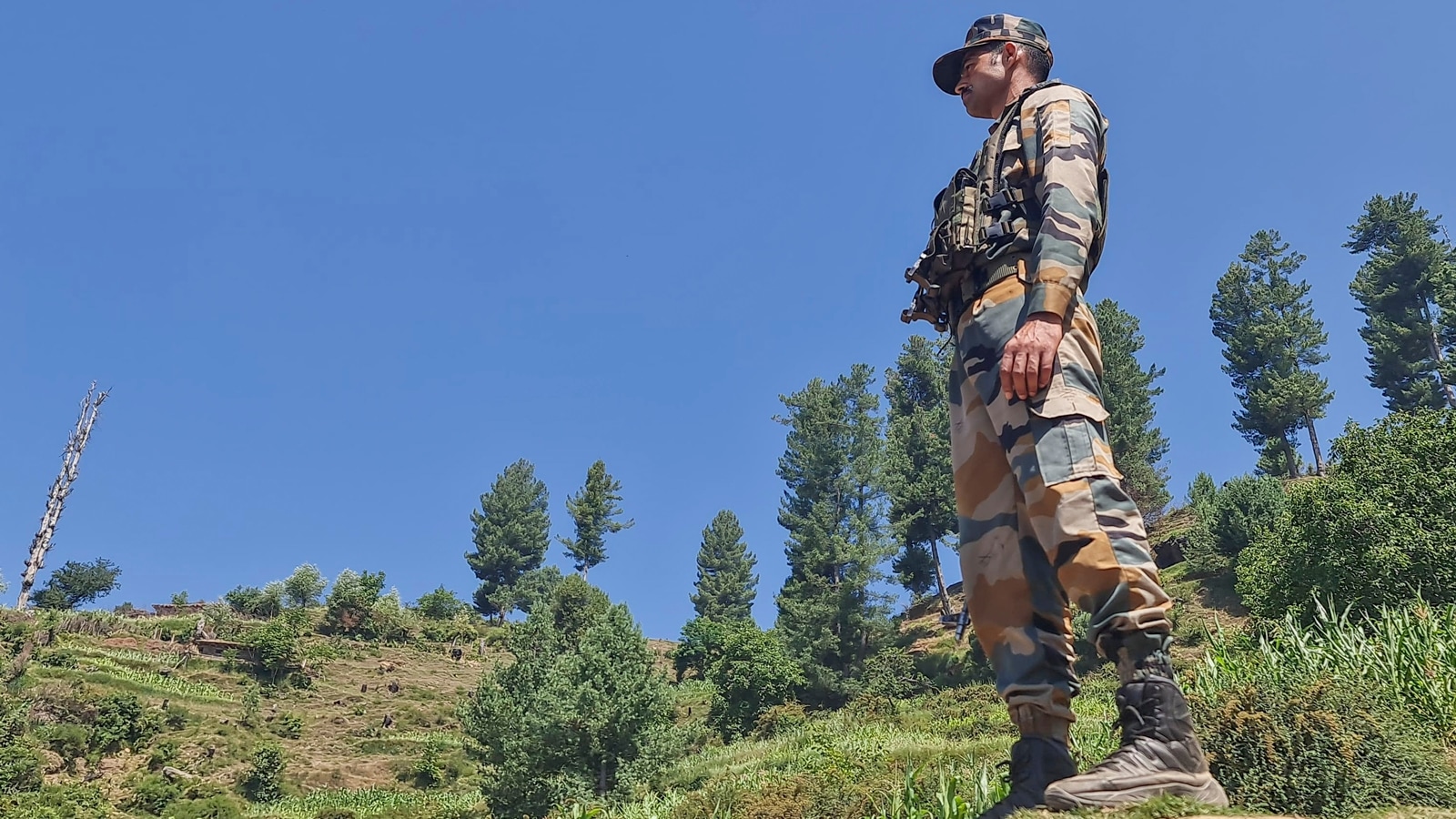Doda attack: Jaish suspects infiltrated six months ago, ‘stayed off grid’ in Jammu
So far, 11 Armed Forces personnel have been killed by such groups, usually comprising three to five men, in six separate attacks this year.
 A soldier near the encounter site in Doda on Wednesday. (PTI)
A soldier near the encounter site in Doda on Wednesday. (PTI)The recent attacks that have rocked the Jammu region are suspected to have been perpetrated by a “fresh batch of terrorists” who infiltrated in the past six months and comprise fighters from Pakistan’s Punjab as well as Khyber Pakhtunkhwa regions, said sources. Most of them are suspected to be Jaish-e-Mohammed (JeM) recruits.
According to sources, while the ‘People’s Anti-Fascist Front’ claimed credit for the attacks in Poonch-Rajouri earlier, the ‘Kashmir Tigers’ took responsibility for the more recent attacks in Doda-Kathua. Both these groups are suspected to be JeM fronts, said sources.
The groups are highly trained, motivated and those from the Khyber Pakhtunkhwa region may also have battle experience, including in Afghanistan, said sources in the security establishment. Former Pakistan Army soldiers may also be among them, added sources.
So far, 11 Armed Forces personnel have been killed by such groups, usually comprising three to five men, in six separate attacks this year. Most of these casualties have taken place in the past few weeks alone. Besides, nine passengers also died when a civilian bus was targeted in Reasi last month.
 J&K L-G Manoj Sinha pays tribute to the Army personnel in Jammu, Tuesday. (PTI)
J&K L-G Manoj Sinha pays tribute to the Army personnel in Jammu, Tuesday. (PTI)
The recent incidents come on the back of a series of precision attacks in the Jammu region since October 2021. Before the June-July attacks this year, the Army had already lost close to 40 personnel since 2021. The earlier attacks, however, were focussed in the Poonch-Rajouri sector, near the Line of Control (LoC). But the recent attacks have moved deeper into regions such as Doda, Kathua and Reasi.
“This is a different batch of terrorists that has infiltrated in the past six months. The Poonch-Rajouri sector terrorists, we suspect, continue to operate in that region. The new batch is suspected to have been divided into four-five lean groups, which are operating with considerable stealth and are highly trained,” said a security establishment officer in Jammu and Kashmir (J&K).
Security agencies engaged in counter-terrorism in the region, however, believe they are all drawn from the same pool.
“Both the Poonch-Rajouri and Doda-Kathua-Reasi batches have the same modus operandi. They have the same level of military training, reconnaissance capability, aversion to use of technology or public contact, and apply similar guerilla warfare tactics. Both have similar sophisticated weapons and have been making videos of the attacks. Given the nature of the attacks, the presence of Pathan fighters from the Khyber Pakhtunkhwa region, who have earlier fought alongside the Taliban, cannot be ruled out,” said another officer from J&K.
 Clockwise from top left: Captain Brijesh Thapa, Naik D Rajesh, Sepoy Ajay Kumar Singh and Sepoy Bijendra
Clockwise from top left: Captain Brijesh Thapa, Naik D Rajesh, Sepoy Ajay Kumar Singh and Sepoy Bijendra
“Both groups have made sophisticated videos of the attacks using body cameras, and a backend team puts text in impeccable literary English for propaganda. They sometimes even quote noted authors and poets such as Robert Frost,” said an Armed Forces officer.
The continued attacks, despite aggressive counter operations by the security forces, has the establishment worried. While the groups are estimated to number not more than 20 in both the regions, security forces have not had much success.
“They simply disappear in the thick jungles after the attacks. It is very difficult to chase or locate them in such hilly forests. Recently, when the Army became more careful about its movements, they ambushed an IAF’s administrative unit vehicle in Poonch,” said an Armed Forces officer.
In many of the attacks, like in the recent ambush on an Army convoy in Kathua, they even looted the security forces’ weapons and bulletproof jackets, said sources.
Sources pointed out that the security forces suffered additional casualties in counter operations. In October 2021, for instance, five soldiers were killed in an ambush at Dehra ki Gali in Poonch, and another five were killed when they pursued the attackers.
 A security personnel stands guard during an anti-terror operation in Doda district of Jammu and Kashmir, Tuesday, July 16, 2024. (PTI Photo)
A security personnel stands guard during an anti-terror operation in Doda district of Jammu and Kashmir, Tuesday, July 16, 2024. (PTI Photo)
In May 2023, five Para commandos were killed in Kandi forests of Rajouri as they waited for suspected terrorists to pick up their food. In the recent Doda attack too, five Army personnel were killed during a search operation following an intelligence input.
Explaining the difficulties in tracking these groups, a J&K Police officer said: “They don’t use phones. They don’t go to villages and live with locals. They live in the woods or in caves. They either buy the food carried by Bakarwals in the jungles, or source it from their contacts through a chain that does not lead to them. Food is sometimes dropped in the jungle, which is picked up at will. If they have to send a message, they use a radio frequency messenger that cannot be intercepted. So human intelligence is all we can depend on.”
 Security personnel during an anti-terror operation in Doda district of Jammu and Kashmir, Tuesday, July 16, 2024. (PTI Photo)
Security personnel during an anti-terror operation in Doda district of Jammu and Kashmir, Tuesday, July 16, 2024. (PTI Photo)
Security forces suspect some local support too. “You cannot operate for months, even years, without some local support. They are getting precise information about the movements of security forces. They are constantly on the move. There have been spottings by locals too, and some successes have resulted from them. But we are yet to get a big breakthrough,” the officer said.







